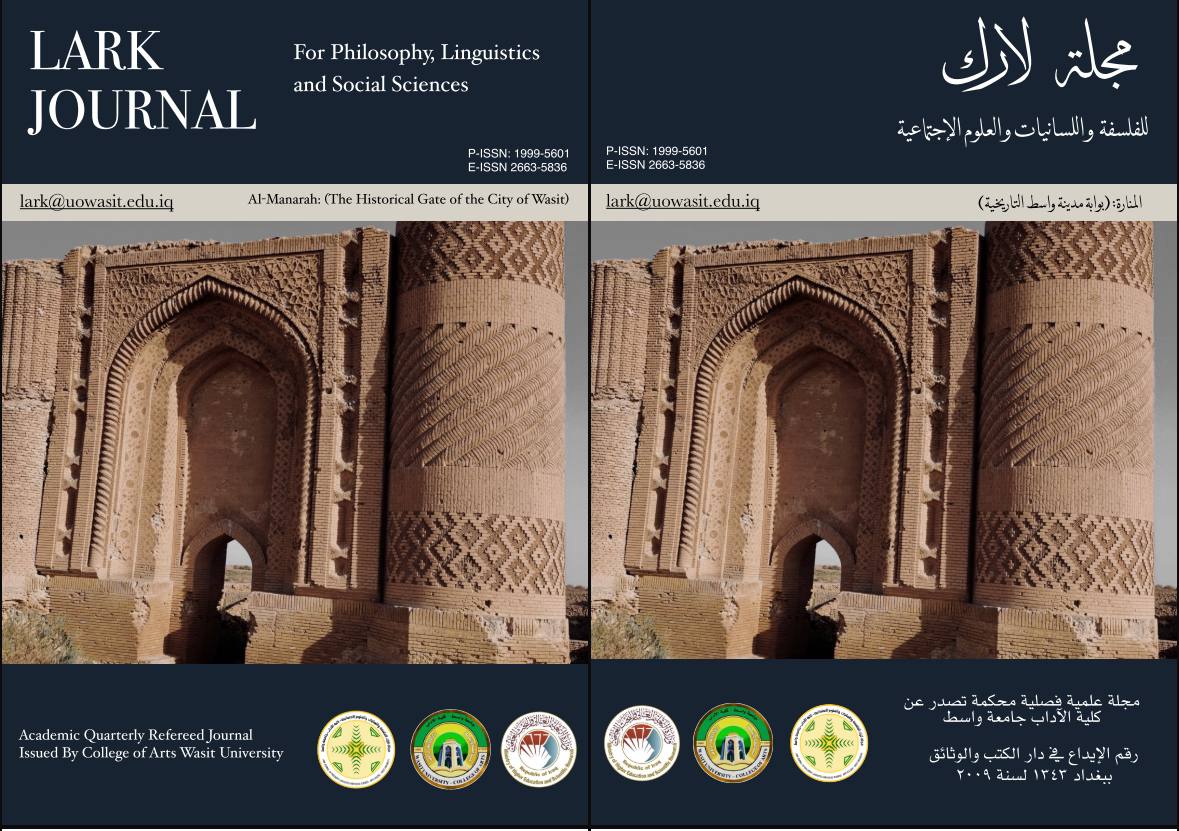The role of improvisational theatre in enhancing critical and creative thinking among art education students in Iraq
DOI:
https://doi.org/10.31185/lark.4207Keywords:
theatre, improvisation, theatrical practice, artistic rupture, impersonationAbstract
The topic of improvisation in theatre has been widely discussed, but the definitions of those who have addressed the concept of improvisational acting have not been specific, comprehensive and in-depth enough, especially as a result of the multiplicity of forms of improvisation. Improvisation in reality remains a criterion that aims to explore and bring something new, and to search for something that has not existed before, something that has not been seen or perceived yet in one way or another, and to accomplish an event or scene that is unimaginable, unreasonable and unfamiliar. Consequently, an artistic and aesthetic break occurs with the rest of the ordinary scenes that the observing viewer is accustomed to routinely and repeatedly. This accomplished event must also be an involuntary and unintended event, and what the actor can reveal to others of secrets that penetrate his depths can form the basic tone to which the recipient responds. If the artist is able to separate his acting self from his performing self, he will merge and identify with the latter. As for the former, he must go to it with analysis, criticism and impersonation, in search of the human essence through the network of relationships on stage, which can only be achieved through the collective spirit.
Improvisation does not contain secrets or masks, and the actor’s improvisational performance may be distributed among several characters and voices, ranging between the conscious and the unconscious, between the positive and the negative, between the subjective and the objective. The theatrical practice here remains charged with emotions and automatic responses that contribute to reaching the essence of the human being. Such works are visual and auditory experiences more than verbal experiences, avoiding cultured verbal formulations and addressing the spectator’s pre-feelings in a way that is necessarily poetic and philosophical.
References
المراجع
العربية:
-اكويندي، سالم، (1990)، المسرح المدرسي، المغرب الجديدة.
- أحمد زكى، (1989). الإخراج المسرحي، الهيئة المصریة العامة للكتاب، القاهرة، ص 26.
- إيبرت، جيرهارد، (2002 م)، الارتجال وفن التمثيل المسرحي، ترجمة. حامد أحمد غانم، مركز اللغات والترجمة، أكاديمية الفنون، القاهرة.
- إيفانز، جيمس روز، (1979 م)، المسرح التجريبي من ستانسلافسكي إلى اليوم، ترجمة. فاروق عبد القادر، دار الطباعة الحديثة، القاهرة.
- بافيس، باتريس، (1990). قاموس المسرح، المطبعة الاشتراكية، باريس.
- بوال، أوغستو، (1997 م)، منهج أوغستو بوال في مسرح المقهورين، ترجمة. نورا أمين، مركز اللغات والترجمة، أكاديمية الفنون، القاهرة.
- جوردون، هايو، (1994 م)، التمثيل والأداء المسرحي، ط 2، ترجمة د. محمد سيد، مركز اللغات والترجمة، أكاديمية الفنون، القاهرة.
- حمدي، صفیة أحمد محى الدین، (2007). التصميم الابتكاري لعروض التعبیر الحركي (عناصر الحركة –
الارتجال – المسرحة)، القاهرة، مكتبة الأنجلو المصریة، ص84.
- حمداوي، جميل، (2012 م)، الممثل المرتجل في نظرية المرتجلات، مؤسسة المثقف العربي، صحيفة المثقف الالكترونية، العدد 2101 م، سدني.
- دودين، سمر، (2002). توظيف الدراما في التربية والتعليم، مجلة الدراما، العدد الأول، الأردن، عمان.
- سانشيت، خوسيه انطونيو، (2004 م)، فن مسرحة الصورة، ترجمة. خالد سالم، نشرة مهرجان القاهرة الدولي للمس رح التجريبي، ال عدد16، مركز اللغات والترجمة، أكاديمية الفنون، القاهرة.
- سبولين، فيولا، (1999 م)، ارتجال للمسرح، ترجمة سامي صلاح، مركز اللغات والترجمة، أكاديمية الفنون، القاهرة.
- سعد، صالح، (2001 م)، الأنا -الآخر: ازدواجية الفن التمثيلي، اﻟﻤﺠلس الوطني للثقافة والفنون والآداب، الكويت.
- فروست، أنتوني، ويارو، رالف، (1994 م)، الارتجال في الدراما، مركز اللغات والترجمة، أكاديمية الفنون، القاهرة.
- المنيعي، حسن، (1992 م)، المسرح والارتجال، ط 1، عيون المقالات، الدار البيضاء.
- الياسين، ماري، حنان قصاب حسن، (2015). خصائص المسرح التفاعلي (عرض مسرحية أعزيزة)، لارك للفلسفة واللسانيات والعلوم الاجتماعية، العدد (20)، السنة السابعة. https://lark.uowasit.edu.iq/index.php/lark/article/view/672.
الأجنبية:
- Pickering، Kinneth (1997)، Drama Improvised، Theatre Arts Books، USA.
-Brain, way (1971) development through drama, London, longment,
-Toby Cole And Helen Krich Chinoy، (1970)، Actorson Cting، Three Rivers Press، NewYork.
Downloads
Published
Issue
Section
License
Copyright (c) 2025 م.م. ظافر محسن طه

This work is licensed under a Creative Commons Attribution 4.0 International License.





